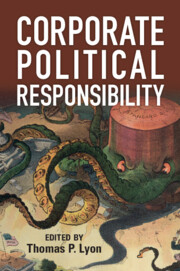Book contents
- Corporate Political Responsibility
- Reviews
- Corporate Political Responsibility
- Copyright page
- Contents
- Figures
- Tables
- Contributors
- Preface
- Section I Foundations of Corporate Political Responsibility: Metrics for Disclosure and Good Governance
- Section II Transparency: Causes and Consequences
- Section III Accountability: Linking Corporate Social Responsibility, Employee Relations, and Corporate Political Responsibility
- 6 Responsible Lobbyists?
- 7 License to Give
- 8 Multinational Companies as Responsible Political Actors in Global Business
- Section IV Responsibility: Corporate Political Responsibility and Climate
- Section V Implementing Corporate Political Responsibility: Opportunities and Challenges
- Index
- References
7 - License to Give
The Relationship between Organizational Reputation and Stakeholders’ Support for Corporate Political Activity
from Section III - Accountability: Linking Corporate Social Responsibility, Employee Relations, and Corporate Political Responsibility
Published online by Cambridge University Press: 16 November 2023
- Corporate Political Responsibility
- Reviews
- Corporate Political Responsibility
- Copyright page
- Contents
- Figures
- Tables
- Contributors
- Preface
- Section I Foundations of Corporate Political Responsibility: Metrics for Disclosure and Good Governance
- Section II Transparency: Causes and Consequences
- Section III Accountability: Linking Corporate Social Responsibility, Employee Relations, and Corporate Political Responsibility
- 6 Responsible Lobbyists?
- 7 License to Give
- 8 Multinational Companies as Responsible Political Actors in Global Business
- Section IV Responsibility: Corporate Political Responsibility and Climate
- Section V Implementing Corporate Political Responsibility: Opportunities and Challenges
- Index
- References
Summary
This chapter explores the relationship between a firm’s informal nonmarket strategy, reflected in its reputation for social responsibility, and stakeholders’ support for formal nonmarket strategy targeting government officials. We argue that a firm’s informal nonmarket performance shapes stakeholders’ willingness to enable its formal nonmarket strategy by funding its corporate political action committee. In this way, a reputation for social responsibility operates as a social license for a firm to politically engage. We examine how a firm's overall reputation and reputation for employee relations affect employees’ contributions to firms' PACs. Through analyses of a hand-collected dataset of employees’ contributions to corporate PACs, we find that a firm’s reputation for employee relations, but not its overall social reputation, is positively associated with employee support of a firm’s formal nonmarket strategy. These findings illustrate a link between a firm’s informal and formal nonmarket strategies and demonstrate a potential constraint on corporate political influence.
Keywords
- Type
- Chapter
- Information
- Corporate Political Responsibility , pp. 188 - 215Publisher: Cambridge University PressPrint publication year: 2023

